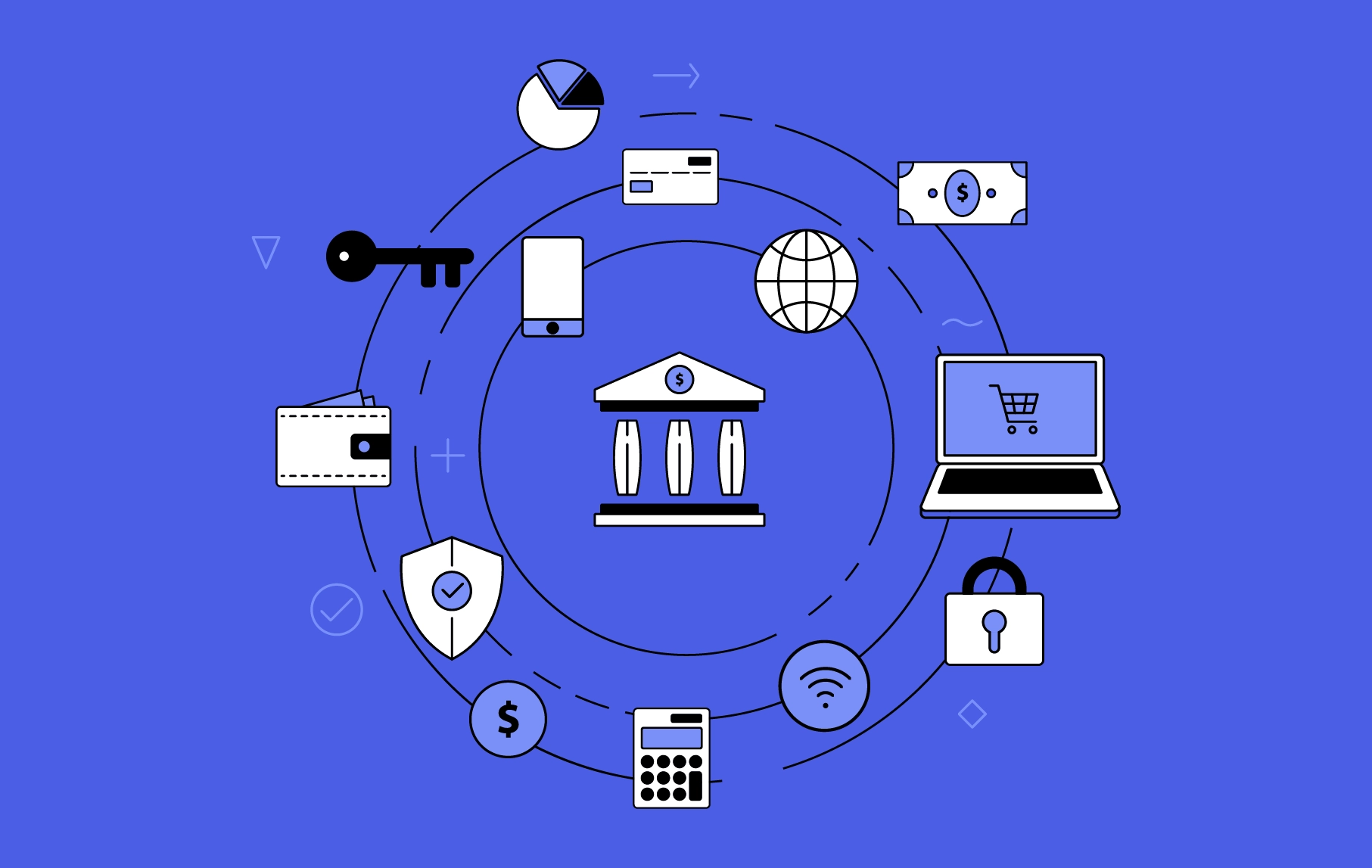- What is RegTech?
- Understanding the Key Distinctions: RegTech vs. FinTech
- Key Benefits of RegTech Implementation
- Increased Productivity
- Enhanced Precision
- Cost Reduction
- Enhanced Data Security
- Proactive Risk Management
- Simplified Banking Processes
- Key Features to Implement in RegTech Solutions
- Data Aggregation and Integration
- Advanced Reporting and Analytics
- Automated Compliance Monitoring
- Regulatory Change Management
- Record-Keeping
- Workflow Automation
- Risk Assessment and Management
- Collaboration and Communication Tools
- Regulatory Reporting Templates
- Compliance Dashboard
- Steps to Build a Custom RegTech Solution
- Understand the Regulatory Landscape
- Outline Your Goal
- Choose the Right Technology Stack
- Data Collection and Integration
- Develop Compliance Algorithms
- Work on UI/UX Design
- Proceed to Regulatory Software Development
- Automate Compliance Processes
- Implement Cybersecurity Measures
- Conduct Extensive Testing
- Ensure Compliance Monitoring and Reporting
- A Closer Look at the Popular RegTech Use Cases
- HSBC Life
- Wells Fargo
- Citigroup
- Barclays
- Initiate Your RegTech Compliance Software Development Project With Appinventiv
- FAQs
As industries struggle with recent technological breakthroughs, traditional approaches to regulatory compliance are undergoing a fundamental transition. The advent of RegTech, or regulatory technology, is a major factor changing how businesses and organizations deal with the complexities of regulatory compliance.
The need for innovative approaches to strengthen and speed up regulatory processes has never been higher in a time of copious amounts of data, linked systems, and complex regulatory frameworks. In this regard, RegTech solutions are potent catalysts for transforming a range of functions in numerous industries.

Risk management and regulatory compliance are two roles that stand out as focal points that radically change conventional methods. RegTech closes compliance gaps and moves businesses toward more proactive, effective, and secure operating environments by utilizing sophisticated data gathering, analysis, and real-time risk assessment.
This paradigm shift in regulatory technology is not merely a response to change; it signifies a proactive embrace of the possibilities offered by interconnected systems and sophisticated analytics in an era defined by intricate regulatory frameworks.
In this blog, we will explore what RegTech is, how it’s different from FinTech, and why it matters in banking. We will break down the steps involved in custom regulatory software development, understand key features of RegTech solutions, and study its use cases with real benefits. Let’s take it step by step together.
What is RegTech?
RegTech, or regulatory technology, is the term used to describe how advanced technologies like blockchain, artificial intelligence, cloud computing, and data analytics are integrated to streamline and expedite compliance processes. It serves as a critical driver, particularly in the financial sector, helping businesses easily navigate complex regulatory environments.
RegTech enables institutions to reduce risks, save expenses, and improve overall compliance effectiveness by automating manual processes, improving data accuracy, and offering real-time monitoring and reporting capabilities. This transforms operational efficiency in the changing realm of digital regulations. In addition to addressing issues with traditional compliance, it paves the way for a more flexible and resilient response to regulatory obligations across various businesses.
The 3 key pillars of RegTech are cost, customer, and compliance. Cost emphasizes the need for cost-effectiveness and process simplification. This entails maximizing human resources by assigning them to the most appropriate duties and putting direct data interfaces in place to get rid of unnecessary Excel-based procedures.
The second aspect, Customer, emphasizes a customer-centric approach, aiming to elevate the overall customer experience. Businesses can efficiently customize their strategies, services, and products to meet client requirements and expectations by placing the customer at the center of their operations. The third and last factor, Compliance, emphasizes how important technology is for facilitating and verifying regulatory compliance.
The current global RegTech market size is projected to reach a valuation of $19.5 billion by the end of the year 2026. The surge in regulatory requirements, the need for real-time monitoring, and the growing volume of financial transactions have propelled the market demand for RegTech, as businesses seek efficient, automated solutions to navigate the complicated regulatory landscape.
Understanding the Key Distinctions: RegTech vs. FinTech
Navigating the complex world of finance and regulation, RegTech (Regulatory Technology) streamlines compliance processes, while FinTech (Financial Technology) innovates financial services through technology. Here’s a detailed table outlining the difference between RegTech and FinTech:
| Key Aspects | RegTech | FinTech |
|---|---|---|
| Objective | Focuses mostly on risk management, industry rules compliance and regulatory compliance | Emphasizes using technology to improve and reinvent financial services and procedures |
| Industry | Employed across various sectors, including healthcare, energy, and more, to handle regulatory compliance outside the financial industry | Primarily applied within the financial industry but can extend to non-financial sectors for financial service innovations |
| Area of Concern | Compliance with legal requirements, risk reduction, cybersecurity, and data protection | This ensures innovative financial services, user experience, seamless transactions, financial inclusion, and data security |
| Major Technologies | Uses automation, blockchain, artificial intelligence, and machine learning to improve regulatory procedures | Utilizes digital payment methods, blockchain, robo-advisors, and apps to enhance financial services |
| Key Examples | Compliance.ai, Quantexa, Chainalysis | Robinhood, PayPal, Stripe, Square |
Key Benefits of RegTech Implementation
RegTech implementation offers streamlined compliance processes, enhancing accuracy, and reducing manual efforts, ultimately promoting operational efficiency and cost savings for organizations. Let’s have a detailed look at the key benefits of RegTech implementation.

Increased Productivity
RegTech automates repetitive tasks, including data collecting, processing, and reporting to simplify complicated regulatory processes. This effectiveness guarantees timely adherence to regulatory requirements, decreases manual workload, and speeds up compliance procedures.
Enhanced Precision
By utilizing automation and sophisticated analytics, RegTech reduces the possibility of human error in duties pertaining to compliance. Accurate reporting is facilitated by real-time monitoring and data analysis, lowering the number of non-compliance incidents and related fines.
Cost Reduction
RegTech cuts operating expenses associated with human labor significantly by automating labor-intensive compliance operations. Organizations can save money overall because of the increased productivity and lower risk of fines for noncompliance.
Enhanced Data Security
RegTech protects sensitive regulatory data with cutting-edge cybersecurity techniques. Encryption, secure authentication protocols, and robust cybersecurity practices ensure the integrity and confidentiality of data, mitigating the risk of data breaches.
Proactive Risk Management
RegTech’s real-time risk identification capabilities empower organizations to address possible concerns and gaps in compliance proactively. Businesses can foresee and reduce hazards before they worsen through predictive analytics, which further improves risk management.
Simplified Banking Processes
RegTech in banking plays a crucial role in improving risk identification and mitigation in the banking industry while also optimizing resource allocation and cutting expenses. It is a strategic asset that enables banks to proactively handle compliance difficulties and ensure operational efficiency and resilience in the face of regulatory changes rather than just being a tool for adherence.
Key Features to Implement in RegTech Solutions
From automated compliance workflows to real-time monitoring, these features empower businesses to navigate regulatory landscapes seamlessly. Here are some of the essential features to implement in RegTech solutions that can help businesses in elevating operational efficiency:

Data Aggregation and Integration
This feature allows for smooth integration with various internal and external data sources, giving compliance analysts a complete picture of the data.
Advanced Reporting and Analytics
The advanced reporting and analytics feature utilizes AI to analyze data thoroughly and provide actionable insights.
Automated Compliance Monitoring
This feature enables real-time tracking of regulatory changes and automates regular compliance checks to guarantee adherence without manual intervention, making it easier to adapt to changing regulations.
Regulatory Change Management
This feature makes proactive adjustments possible by ensuring that organizations are informed about changes in compliance requirements. It detects and keeps track of regulatory changes in real-time, notifying and alerting relevant parties.
Record-Keeping
This feature keeps thorough records of compliance procedures, building a thorough audit trail for accountability and openness. It helps in proving compliance in the event of a regulatory audit.
Workflow Automation
The workflow automation feature simplifies compliance procedures by lowering human labor, increasing operational efficiency, and automating repetitive, rule-based tasks.
Risk Assessment and Management
This feature uses algorithms to assess risks in real-time, quickly detecting and reducing compliance problems helping businesses handle possible compliance issues proactively.
Collaboration and Communication Tools
Offers tools to help stakeholders in compliance management collaborate and communicate effectively.
Regulatory Reporting Templates
This feature makes reporting easier by providing pre-made templates for common regulatory reports.
Compliance Dashboard
This feature provides a comprehensive view of compliance status by centralizing compliance data on a dashboard.
Steps to Build a Custom RegTech Solution
Regulatory software development involves several key steps. From meticulous regulatory analysis to agile development, these steps ensure the development of a robust and compliant system, aligning seamlessly with your specific business needs and other regulatory requirements.

Understand the Regulatory Landscape
Understanding the regulatory environment is crucial for designing a custom RegTech solution. Begin by identifying the exact regulations that apply to your sector, considering the complex details that influence adherence.
Simultaneously, conduct a comprehensive analysis of existing compliance challenges and pain points to understand the challenges faced.
Outline Your Goal
The next step is to define the goals for your project. Give a clear explanation of the general aims and particular goals that your RegTech solution seeks to accomplish. Make it clear which regulatory procedures you want to improve or streamline so that you can effectively address compliance issues with a targeted and focused strategy.
This clarity serves as the cornerstone for creating a solution that perfectly satisfies the regulatory environment’s specific needs in your business.
Choose the Right Technology Stack
Opting for the right technology stack is pivotal for building a robust RegTech solution. It’s imperative to ensure the chosen stack is adept at meeting current needs and scalable to accommodate future growth.
Prioritize compatibility to ensure smooth integration with current systems within the regulatory framework and strongly emphasize security measures to protect sensitive regulatory data. This meticulous selection of technologies establishes a RegTech solution that is both agile and resilient to changing compliance challenges.
Data Collection and Integration
Integrating and gathering data effectively are essential elements when it comes to building robust RegTech solutions. Start by methodically compiling and arranging relevant data sources essential for adhering to regulations. Strengthen integration capabilities by seamlessly connecting with both external and internal data repositories, ensuring a comprehensive and thorough approach.
In addition to facilitating real-time data access, this integration gives the RegTech solution access to a wide variety of information, which improves its capacity to track, evaluate, and effectively react to regulatory changes.
Develop Compliance Algorithms
In the context of RegTech compliance software development, creating compliance algorithms is critical for robust regulatory management. Utilize advanced technologies like AI to build algorithms for proactive risk assessment, anomaly detection, and real-time monitoring. Using these cutting-edge technologies, the RegTech system can dynamically analyze large datasets, spot trends, and quickly address new compliance concerns.
Most importantly, make sure that these algorithms can adjust to changing regulatory requirements so that the system can remain flexible and sensitive to shifts in the regulatory environment.
Work on UI/UX Design
Design an intuitive and user-friendly interface tailored for end-users, simplifying their interaction with your RegTech solution. Prioritize accessibility, making the interface inclusive and user-friendly.
Additionally, emphasize UI/UX’ responsiveness to guarantee seamless performance across various devices and platforms. A well-thought-out UI/UX enhances user satisfaction and plays a crucial role in fostering user adoption.
Proceed to Regulatory Software Development
Once the UI/UX design is finalized, the next stage involves the actual development of the RegTech solution. Your hired app development team will bring the envisioned interface to life, incorporating all the necessary features and functionalities required for effective regulatory compliance.
This phase focuses on coding, testing, and refining the solution to ensure it aligns seamlessly with the design specifications while prioritizing robust performance and functionality.
Automate Compliance Processes
Streamline operations by automating repetitive and rule-based RegTech compliance processes, reducing the burden on manual efforts and minimizing the risk of errors. Integrate workflow automation to improve overall productivity and ensure tasks move through the compliance lifecycle without any issues.
RegTech streamlines procedures by automating repetitive tasks, freeing up human resources to focus on more intricate and strategic facets of regulatory administration. When navigating the complexities of regulatory compliance, this dual approach to automation enables firms to strike an appropriate balance between speed, accuracy, and adaptability.
Implement Cybersecurity Measures
It is extremely crucial to prioritize cybersecurity measures to protect sensitive regulatory data. Establish strong security measures to guarantee the confidentiality and integrity of data stored on the system. Encryption of sensitive information adds additional protection, rendering data unreadable to unauthorized entities even if it is breached.
Create safe user authentication procedures to manage access and guarantee that authorized persons can only access and alter regulatory data. By implementing these cybersecurity measures, the RegTech solution strengthens its defenses against possible data breaches. It boosts user and regulatory body confidence, hence preserving the integrity of the compliance management system.
Also Read: How to Build a Secure App to Ensure FinTech Cybersecurity
Conduct Extensive Testing
Conduct extensive and stringent testing methods to ensure the custom RegTech solution satisfies regulatory compliance standards. Utilize simulations to verify the system’s functionality in various scenarios, guaranteeing its robustness in actual settings. This rigorous testing process ensures that the RegTech solution can handle a variety of regulatory scenarios in addition to locating and fixing possible bugs.
RegTech developers provide the groundwork for a robust and high-performing compliance management system by strongly emphasizing testing and quality assurance in the constantly changing world of regulatory regulations.
Ensure Compliance Monitoring and Reporting
Implement real-time monitoring capabilities to enable continuous monitoring of regulatory adherence. By implementing this proactive strategy, the RegTech solution can promptly detect and handle possible compliance problems as they emerge.
At the same time, create configurable reporting tools that give stakeholders information about the state of compliance and thorough audit trails. These attributes promote transparency and enable organizations to provide customized reports that comply with particular legal mandates.
You may like reading: How to Develop Regulatory Compliance Software for the Financial Industry?
A Closer Look at the Popular RegTech Use Cases
RegTech is known for its widespread applications across numerous industries, from automating regulatory compliance processes to real-time risk identification and predictive fraud analysis. Let’s have a look at the popular RegTech use cases.

HSBC Life
HSBC Life collaborated with Featurespace, a leading RegTech provider, to implement an automated transaction monitoring system. HSBC, a well-known player in the banking sector, wisely uses RegTech to support compliance monitoring and proactively manage risks, guaranteeing stringent conformity to international financial standards.
This collaboration with Featurespace is a prime example of HSBC’s dedication to utilizing cutting-edge technology to improve its capacity to manage the ever-changing regulatory compliance environment in the financial industry.
Wells Fargo
Wells Fargo, a popular FinTech leader, strategically employs RegTech to strengthen its fraud detection and prevention measures. The bank leverages cutting-edge machine learning models and complex algorithms by means of cooperative relationships with top RegTech vendors.
Wells Fargo can quickly detect and stop possible fraudulent activity thanks to this strategic integration, giving its clients a stable and safe financial environment. Wells Fargo demonstrates its dedication to upholding the highest standards of security and integrity in the quickly changing world of digital finance by staying on the cutting edge of RegTech innovations.
Citigroup
Citigroup is a prime example of a company that proactively approaches regulatory compliance by utilizing RegTech solutions to simplify its complex reporting processes. Citigroup greatly minimizes human labor while guaranteeing the timeliness and accuracy of regulatory reports by implementing automation and data analytics strategically.
In addition to improving the overall effectiveness of compliance procedures, Citigroup’s dedication to utilizing cutting-edge technologies establishes it as a leader in adopting innovation for regulatory excellence. Citigroup is committed to upholding the highest accuracy, efficiency, and compliance standards in the ever-changing world of financial laws by remaining at the forefront of RegTech innovations.
Barclays
Barclays adopts a proactive approach to combating financial crimes by deliberately incorporating RegTech into its transaction monitoring and reporting procedures. The bank strengthens its adherence to strict anti-money laundering (AML) rules by utilizing real-time monitoring capabilities to identify and rectify anomalies through cooperative efforts with RegTech providers.
With this approach, Barclays not only bolsters its defenses against illegal activity but also demonstrates its commitment to upholding the banking industry’s highest security and compliance standards.
Also Read- IT Compliance Regulations for Industries in the US
Initiate Your RegTech Compliance Software Development Project With Appinventiv
The transformative impact of RegTech innovations on the compliance landscape cannot be overstated. By integrating state-of-the-art technologies, they facilitate collaboration, improve data management, reduce risks, expedite operations, and guarantee scalability. RegTech is becoming essential for businesses to not only comply with increasing regulatory requirements but also to prosper in the digital world.
As a leading FinTech application development service provider, Appinventiv provides full regulatory technology services and expertise in custom regulatory software development, enabling organizations to navigate changing compliance environments innovatively and efficiently. Our experts help businesses navigate the complexities of regulatory requirements with precision and innovation. This involves in-depth consultations, thorough assessments, and implementation of advanced technologies to create bespoke solutions.
Over the years, we have worked with the leading global brands and startups, helping them build compliant-friendly solutions that garnered them good returns and a massive user base. Our clientele includes renowned FinTech companies like Bajaj Finserv, Mudra, EdFundo, and a leading global bank. You can have a detailed view of our globally acclaimed client list from our portfolio.
From building RegTech solutions for banks to other popular industries, our seasoned experts possess a comprehensive understanding of building RegTech solutions. Connect with our team today to share your RegTech project idea.
FAQs
Q. What are some of the top RegTech trends?
A. Here are some of the prevalent RegTech trends to watch for:
- AI and Machine Learning Integration
- Automated Compliance Monitoring
- Holistic Risk Management
- Blockchain for Compliance
- Cloud-Based RegTech Solutions
- Regulatory Sandboxes
- Sustainability and ESG Compliance
- Digital Identity Verification
- Regulatory Reporting Automation
- Collaboration and Information Sharing Platforms
- Privacy and Data Protection Solutions
Q. What are some of the top 4 categories of RegTech?
A. The RegTech industry encompasses various categories. This includes:
Risk management and compliance: This includes monitoring modifications to regulations, ensuring compliance standards are followed, and controlling risk across the company.
Fraud prevention and identity verification: RegTech solutions are crucial for fraud prevention and identity verification, especially in sectors with stringent Know Your Customer (KYC) regulations. These solutions improve cybersecurity, identify fraudulent activity, and validate identities using cutting-edge technologies.
Regulatory Data Management and Reporting: This category includes solutions crafted to streamline the intricate and time-consuming regulatory reporting procedures, focussing on automating reporting, analysis, and data collection, ensuring accuracy.
Data privacy and cybersecurity: RegTech solutions in this category focus on protecting sensitive data and guaranteeing compliance with data protection laws due to the rising frequency and sophistication of cyberattacks. This also includes monitoring tools, secure authentication, and encryption to prevent data breaches.
Q. How is RegTech integrated into existing banking systems?
A. RegTech in banking implementation unfolds through several strategic steps, seamlessly integrating advanced technologies to enhance regulatory compliance.
- Assessment of Current Systems
- Customization and Integration
- API Integration
- Data Migration
- Training and Adoption
- Continuous Monitoring
- Scalability
- Compliance Testing
- Feedback Mechanisms


- In just 2 mins you will get a response
- Your idea is 100% protected by our Non Disclosure Agreement.

How Appinventiv Solved Scalability Challenges for FinTech Platforms with 10M+ Users
Scalability is a crucial element in the FinTech sector as it is experiencing phenomenal growth due to the global population's need for streamlined, on-demand security and instant financial services. With the rise in user bases and transaction volume, FinTech applications must manage the growing demand without compromising performance or security, while also providing a pleasant…

How Much Does it Cost to Build a Personal Finance App like Pocketsmith?
Imagine an app that knows when your rent is due, reminds you of upcoming bills, forecasts your savings 12 months ahead, and tells you if that third coffee this week is wrecking your budget. That’s the kind of experience apps like PocketSmith deliver, and it’s exactly why personal finance apps are becoming a must-have for…

How Much Does it Cost to Build a Mobile Banking App Like Halifax in the UK?
The way people bank has changed dramatically. Gone are the days of waiting in long queues or rushing to a branch before closing hours. Today, mobile banking apps like Halifax have redefined convenience, allowing users to check balances, transfer funds, pay bills, and even apply for loans from their smartphones, anytime and anywhere. This shift…

















